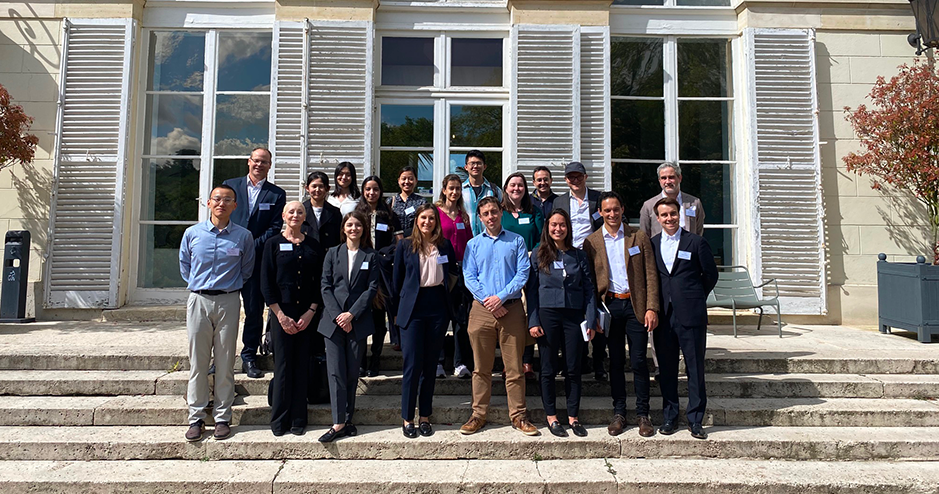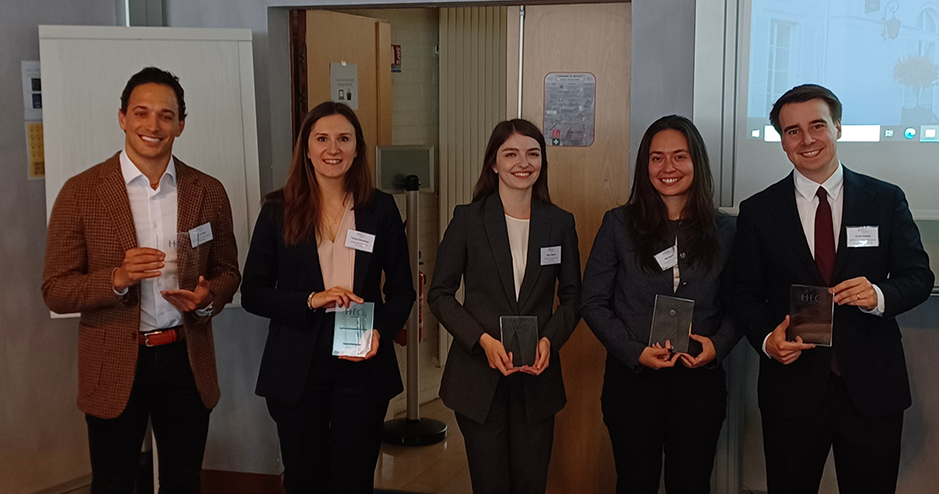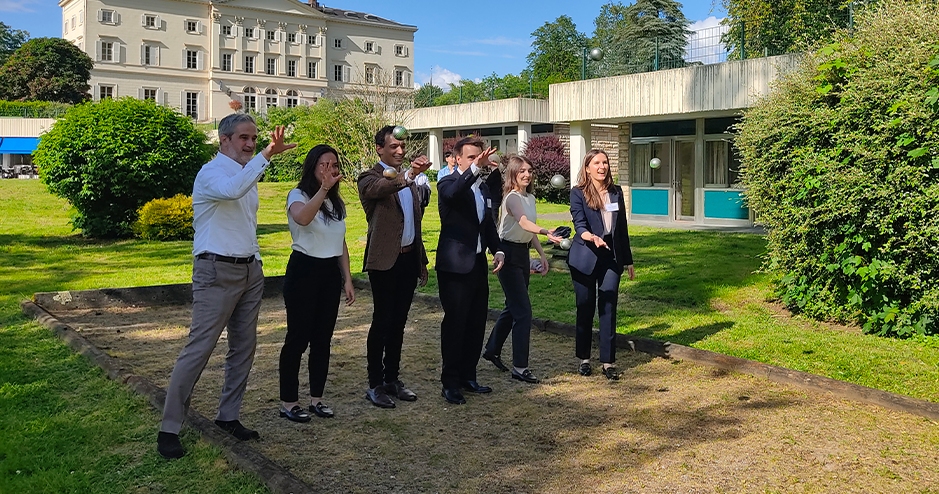Top Finance Graduate Award 2024: Celebrating the Future of Finance
For the second year running, HEC Paris hosted the Top Finance Graduate Award 2024, a celebration of innovation and academic excellence organized by professors Jean-Edouard Colliard and Augustin Landier. The daylong event showcased groundbreaking research by six of the most promising PhD candidates in finance worldwide. Jacob Conway of Stanford University, Taisiya Sikorskaya from London Business School, Tim de Silva from MIT Sloan, Naz Koont from Columbia Business School, Leland Bybee from Yale School of Management, and Julia Selgrad from NYU Stern shared not only their exceptional research but also for their compelling visions of the future of finance. We exchanged with three of them.

The Top Finance Graduate Award is more than a recognition; it is a celebration of the future of finance. As Associate Professor of Finance Jean-Edouard Colliard explains: "We invite the best six PhD candidates in finance of 2024 to present their work at HEC, in front of faculty and PhD students from HEC and other schools from around the world.” Colliard believes this Award encourages students to research novel ideas and break new ground: “This event promotes the work of young scholars, shows younger students the type of research an ambitious PhD program can produce, and builds links between the HEC community and future leaders of the field."
This year confirmed a growing tendency to mix both theoretical and empirical criteria using rich and original data bases. This was reflected by the award-winners, six outstanding candidates from diverse horizons. Each presented their research in 30-minute sessions which demonstrated the depth and diversity of contemporary financial studies. The May 15 conference featured several outstanding papers, and we reached out to three of them.

Jacob Conway: Navigating Corporate Governance and Social Issues
Stanford University’s Jacob Conway is no stranger to the intricate dynamics of corporate finance and industrial organization. His research delves into the causes and consequences of firms engaging with social, political, and environmental issues. “We study the extent to which individuals' consumption decisions are influenced by firms' stances on controversial social issues and the implied incentives for firms to take such stances,” Conway explains shortly after the award ceremony ends. To do this, the academic and his fellow researchers use transactions from a major payment card company to predict cardholders’ likely social alignment with firm stances and to quantify effects on consumption.
And the results could have significant implications: “Consumers most aligned with a firm's social stance increase their consumption at the firm by 19 percent in the month following widely known social stance events, and consumers most opposed to the firm's stance decrease their consumption by 11 percent.” The results of his research indicate that consumers meaningfully respond to their social alignment with firms, and that this consumer response can incentivize profit-maximizing firms to engage with social issues.
Taisiya Sikorskaya: Unveiling the Complexities of Institutional Investors
At the conference, Taisiya Sikorskaya from London Business School provided both an academic and a layman version of her research outline. The future assistant professor at the University of Chicago Booth School of Business brings a profound understanding of asset pricing and institutional dynamics. “I examine how non-bank financial institutions, like investment managers and broker-dealers, impact asset allocation and pricing across different markets.” Sikorskaya focuses on three main areas: the influence of investment managers on asset valuations, retail trading behaviors in options markets, and the pricing inefficiencies in various financial markets. “My work reveals that increasing institutional ownership can make it more challenging and costly to sell stocks short.”
The academic, who previously worked in asset management both in Switzerland and the UK, explores retail trading patterns in the U.S. options market, highlighting retail investor preferences for cheaper options and the associated losses due to transaction costs. “I also delve into how specialized financial institutions exploit market inefficiencies in options and exchange-traded fund markets.” Indeed, by analyzing regulatory data and market participants' holdings, she reveals the intricate relationships between asset demand and lending supply, challenging existing asset pricing theories and advocating for more comprehensive data collection in lending markets.
Tim de Silva: Bridging Household Finance and Behavioral Economics
MIT Sloan's Tim de Silva has been making significant strides in household finance, macro-finance, and public finance in the course of his doctoral research. His work often intersects with behavioral economics, providing fresh insights into the financial behaviors of households and their broader economic implications. De Silva's presentation, titled "Insurance versus Moral Hazard in Income-Contingent Student Loan Repayment," examined the trade-offs between providing insurance and the risk of moral hazard in the context of student loan repayment.
At present this loan debt crisis is affecting over 43 million Americans. According to Education Data Initiative, its rising debt and overall hardship is the result of a total of $1.75 trillion in private and federal student loan debt combined. Currently a Postdoctoral Fellow at the Stanford Institute for Economic Policy Research, De Silva’s findings offer valuable policy insights, particularly in designing student loan systems that balance support for students with incentives for timely repayment.
An Award with Positive Long-term Impact
Reflecting on the award he received on the HEC campus, Jacob Conway confides: "I am honored to have been selected for this award, and I really enjoyed and benefited from this opportunity to get to know my colleagues in the finance profession. I loved learning about the cutting-edge research of my fellow job market candidates, and each of us seemed to be expanding the frontiers of finance in different directions."
Similar emotions are shared by Taisiya Sikorskaya. Receiving the award was a moment of immense pride for the LBS scholar: “Yes, it was an incredible honor,” she says. “I am deeply humbled to be included among such distinguished young economists, and I look forward to working with them in the future. The award ceremony organized by HEC Paris was exceptional, providing a wonderful opportunity to share our research and engage with faculty and PhD students from various French universities in a relaxed and welcoming environment."
For Tim de Silva the award goes well beyond the ceremony itself. "During the PhD, you spend years working on research that you are really passionate about and that maybe one day some people will also find interesting.” The scholar was previously working in Equity Derivatives Sales and Trading at Morgan Stanley and could not imagine being rewarded for such academic explorations: “Having my research selected, along with the fantastic work done by my fellow award recipients and the prestigious list of past recipients, feels quite surreal. An enjoyable aspect of the award was meeting the other recipients, whom we hear so much about on the job market but have never formally met."
A Platform for Future Leaders
Indeed, the Top Finance Graduate Award is not just a symbolic event; it is a launchpad for future leaders in finance. By bringing together the brightest minds and providing them with a platform to share their research, the award fosters a vibrant community of scholars dedicated to advancing our understanding of financial economics. As Jean-Edouard Colliard highlights: "It’s a very prestigious award in the finance community and has been going from strength to strength since it began over ten years ago. It used to be sponsored by AQR Capital Management, then HEC Paris took over this responsibility, but we are looking for a new sponsor. After all, sponsoring the award gives a unique opportunity to discuss advances in finance with future leaders in the field, and even play pétanque with them." Indeed, for the second year in a row the day ended with an introduction of the laureates to the very French discipline of pétanque... with most positive consequences!

The 2024 edition of the award has undoubtedly succeeded in its mission. From stimulating academic discussions to fostering new connections, the conference has left an indelible mark on all participants. As the winners continue their academic and professional journeys, their contributions will undoubtedly shape the future of finance, reflecting the high standards and innovative spirit of the Top Finance Graduate Award.
In conclusion, this award is seen as a testament to the value of fostering young talent in finance. “This is a prestigious and visible award in the finance community," says professor Jean-Edouard Colliard who celebrated his 10 years at HEC Paris by orchestrating the annual award. "The laureates are amongst the six best students out of 200-plus finance PhD students on the international finance job market." In this Olympic year, Copenhagen Business School passed on the baton to HEC in hosting the Award for a second consecutive year. The French business school hopes to compere the event once again in 2025. "By recognizing and promoting the work of emerging scholars, the prize not only celebrates individual achievements but also contributes to the collective advancement of the field," says Colliard. Indeed, the insights and innovations presented by the six 2024 winners - Jacob Conway, Taisiya Sikorskaya, Tim de Silva, Naz Koont, Leland Bybee and Julia Selgrad from NYU Stern - promise to influence financial research and practice for years to come.